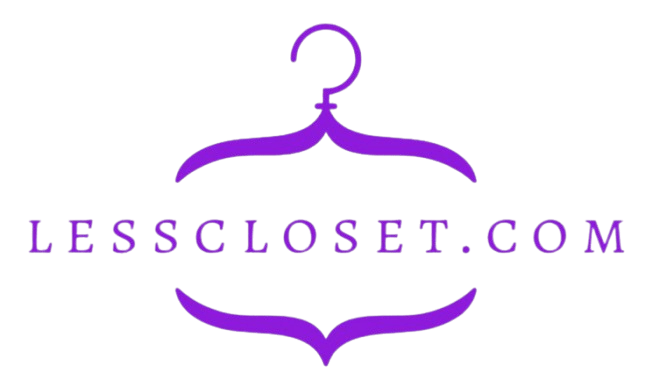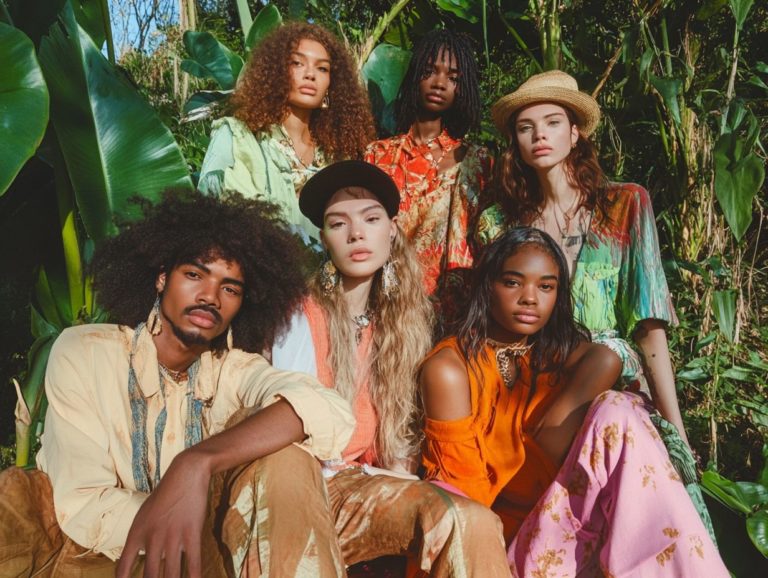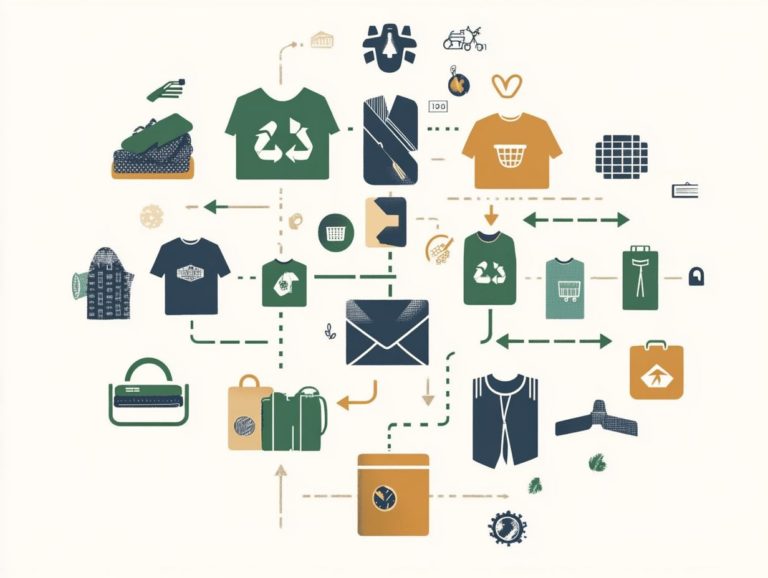How to Make Your Fashion Choices More Ethical
In today s world, the fashion industry is under the microscope, facing growing scrutiny over its environmental and social impacts. As a consumer, your choices can either contribute to these pressing issues or challenge them.
This article delves into the concept of ethical fashion and its importance in nurturing a more sustainable and equitable industry. By understanding the environmental footprint and labor concerns involved, you ll discover actionable steps to make more conscious choices.
This guide will help you curate a wardrobe that aligns with your values.
Don’t miss the chance to transform your fashion habits now!
Contents
- Key Takeaways:
- Understanding Ethical Fashion
- Issues in the Fashion Industry
- Ways to Make Ethical Fashion Choices
- Creating a Sustainable Wardrobe
- Educating Others and Taking Action
- Frequently Asked Questions
- What does it mean to make ethical fashion choices?
- What are some ways to make my fashion choices more ethical?
- Why is it important to make ethical fashion choices?
- How can I find out if a brand is ethical?
- What are the benefits of choosing ethical fashion?
- Can I still be fashionable while making ethical fashion choices?
Key Takeaways:
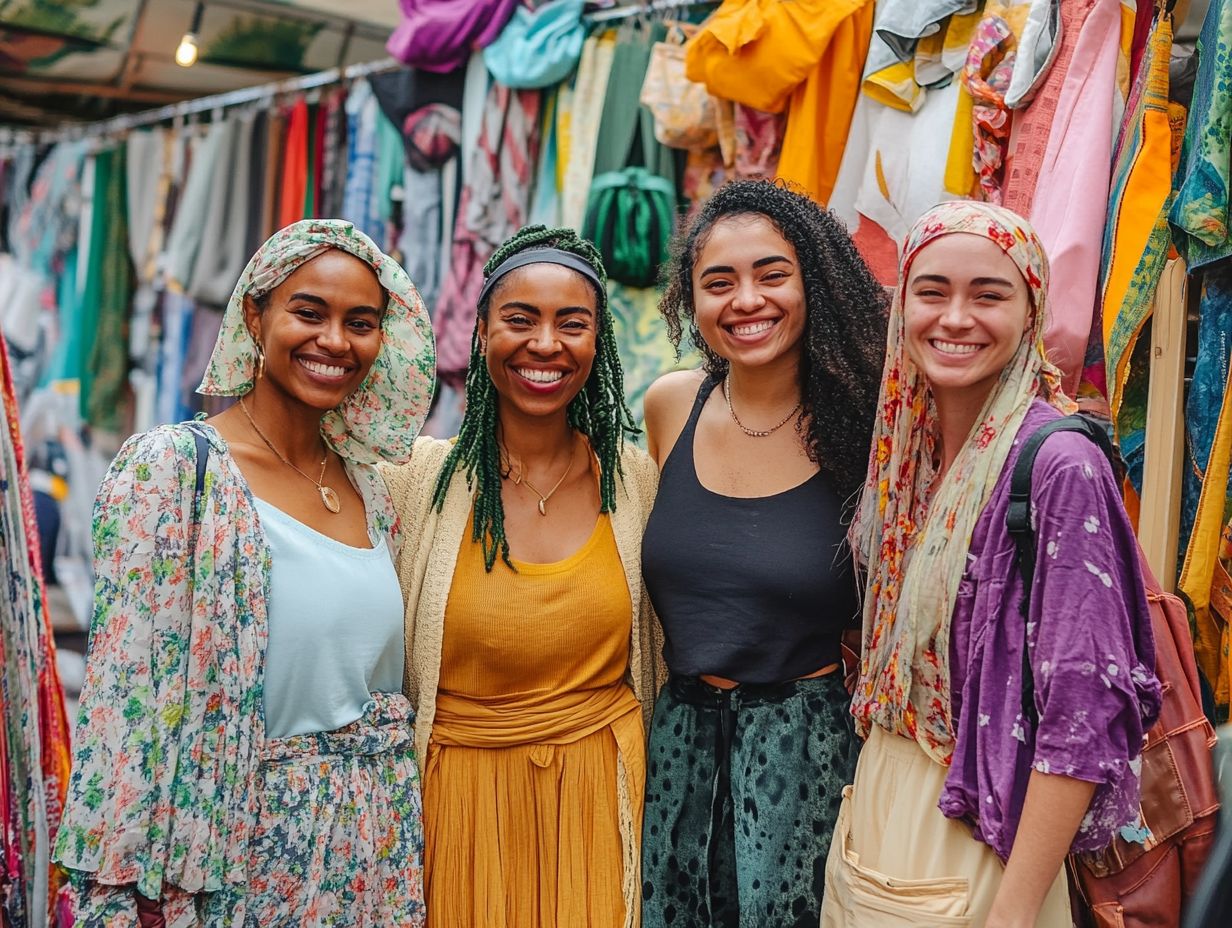
- Ethical fashion means considering the environmental and social impact of your clothing choices. Support sustainable and fair trade practices in the fashion industry.
- Research brands and materials to make informed ethical fashion choices. Build a sustainable wardrobe through a capsule collection and secondhand shopping.
- Educate others and advocate for change in the fashion industry. Every small step towards ethical fashion makes a difference.
Understanding Ethical Fashion
Understanding ethical fashion is essential for discerning shoppers who wish to cultivate a sustainable wardrobe that resonates with their values, especially during Earth Day.
Ethical fashion embodies sustainable practices, emphasizing eco-friendly materials and responsible production methods. This approach reduces the detrimental effects of fast fashion and champions fair labor conditions while supporting a circular economy.
By selecting sustainable brands and investing in timeless pieces that adhere to ethical standards, you can nurture a culture that values quality over quantity. This ensures your wardrobe reflects your ecological and social beliefs.
Defining Ethical Fashion and Its Importance
Ethical fashion embodies clothing and accessories that are thoughtfully designed, produced, and consumed with a commitment to the welfare of people, animals, and the planet. For the conscious shopper, it is crucial to seek out sustainable brands and eco-friendly options.
This movement stands in stark contrast to the damaging practices of fast fashion, which exploit workers, deplete precious resources, and harm the environment. By embracing ethical fashion principles, you can champion brands that prioritize fair labor practices, sustainable sourcing, and timeless design. This encourages a philosophy of quality over quantity, inviting you to invest in durable pieces instead of fleeting trends. For more insights, check out the minimalist’s guide to eco-friendly fashion.
Ethical fashion incorporates elements of the circular economy, where materials are reused and recycled. This significantly minimizes waste and extends the lifecycle of garments. This mindset influences your purchasing decisions and fosters a healthier planet and a more equitable industry.
Issues in the Fashion Industry
The fashion industry, a true hallmark of creativity, faces pressing challenges rooted in the fast fashion movement. This phenomenon exerts profound environmental pressures and raises serious social and labor issues, posing significant obstacles to sustainable practices.
Environmental Impact
The environmental impact of the fashion industry is staggering. Fast fashion plays a significant role in pollution, waste, and the depletion of natural resources, showing we need sustainable practices and eco-friendly alternatives.
You may be surprised to learn that this industry is responsible for a shocking amount of water pollution due to dyes and chemicals that seep into rivers and oceans. This severely harms aquatic life and local communities.
The carbon emissions from manufacturing processes and transportation add fuel to the fire of climate change, resulting in increasingly extreme weather conditions.
Consider the sheer volume of textile waste generated each year. Much of it tragically ends up in landfills, contributing to the waste management crisis.
Embracing sustainable practices, like opting for organic materials, designing clothes that can be reused or recycled, and promoting responsible consumption, allows you to help nurture a healthier planet.
Social and Labor Concerns
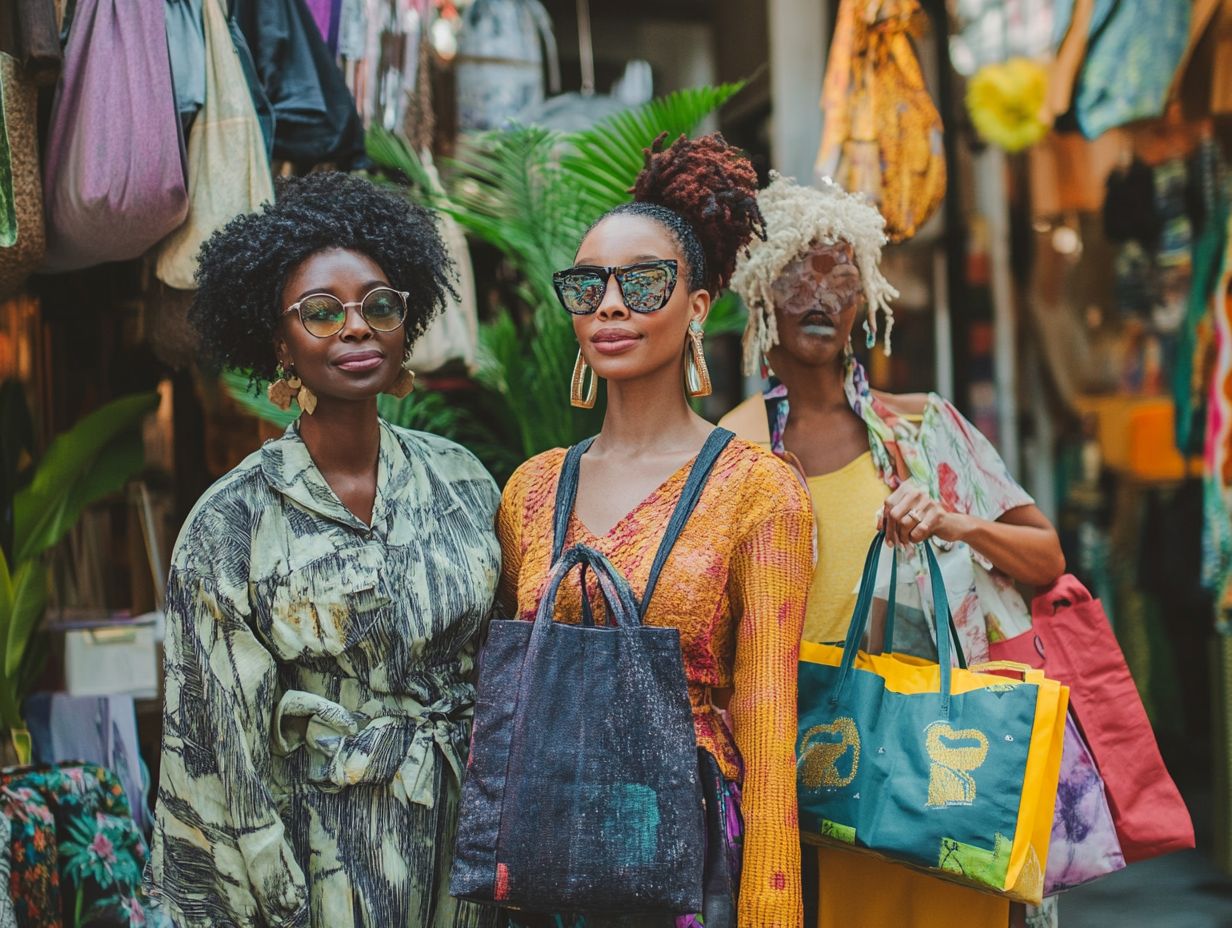
Social and labor concerns are at the heart of the ethical fashion conversation. Many workers in the clothing industry face exploitation, poor working conditions, and inadequate wages.
This troubling reality shows the need for reform in an industry often driven by profit at the expense of people. Workers frequently endure long hours in hazardous environments, with little regard for their health and safety.
The absence of fair compensation perpetuates cycles of poverty, making it increasingly difficult for them to escape these dire circumstances. Ethical fashion seeks to address these challenges by promoting transparency and accountability, pushing brands to adopt fair labor practices.
You, as a consumer, play a vital role in this movement. By demanding higher standards and supporting brands that commit to ethical sourcing and equitable treatment of workers, you can effectively drive the change toward a more just and humane fashion landscape. Additionally, learning how to pair sustainable fashion with minimalism can enhance your impact.
Ways to Make Ethical Fashion Choices
Embracing ethical fashion choices requires a proactive mindset. It involves diving into research on brands and materials, ensuring your selections support sustainable practices and fair trade initiatives that resonate with your values.
Researching Brands and Materials
Researching brands and materials is crucial for anyone dedicated to ethical fashion. This exploration gives you the power to identify sustainable brands that emphasize organic materials and responsible production processes.
To embark on this journey, tap into resources like GoodOnYou.eco. This platform offers extensive brand ratings based on their environmental impact and labor practices, guiding you toward informed choices.
Familiarizing yourself with reputable certifications like GOTS (Global Organic Textile Standard) and OEKO-TEX can further steer you toward high-quality, sustainable options.
Regarding materials, tencel and organic cotton shine for their minimal environmental footprint. Tencel is derived from sustainably sourced wood pulp, while organic cotton is cultivated without harmful pesticides.
By selecting brands that utilize these materials, you actively support sustainable practices that benefit both the planet and the communities involved in production.
Supporting Sustainable and Fair Trade Practices
Supporting sustainable and fair trade practices is essential for ethical fashion, as it gives you the power to select clothing from brands that prioritize responsible production and fair treatment of workers.
By making conscious purchasing decisions, you can play a pivotal role in shaping the fashion industry. This helps guide it toward more environmentally friendly and socially responsible practices.
Brands like Mother of Pearl and Brother Vellies exemplify how ethical production can harmonize with style, proving that fashion doesn t have to come at the expense of our planet or its people.
When you and other consumers unite in prioritizing these brands, you send a powerful message to the industry. This encourages more companies to embrace sustainable and fair trade practices.
This collective action not only fosters transparency but also cultivates a market where ethical considerations are valued. Ultimately, it leads to a transformative shift in how clothing is produced and consumed.
Creating a Sustainable Wardrobe
Creating a sustainable wardrobe requires a mindful approach to your clothing choices, emphasizing quality over quantity.
You might consider adopting a capsule wardrobe, a collection of essential clothing pieces that mix and match well, exploring second-hand shopping, and investing in timeless pieces that endure changes in fashion.
Building a Capsule Wardrobe
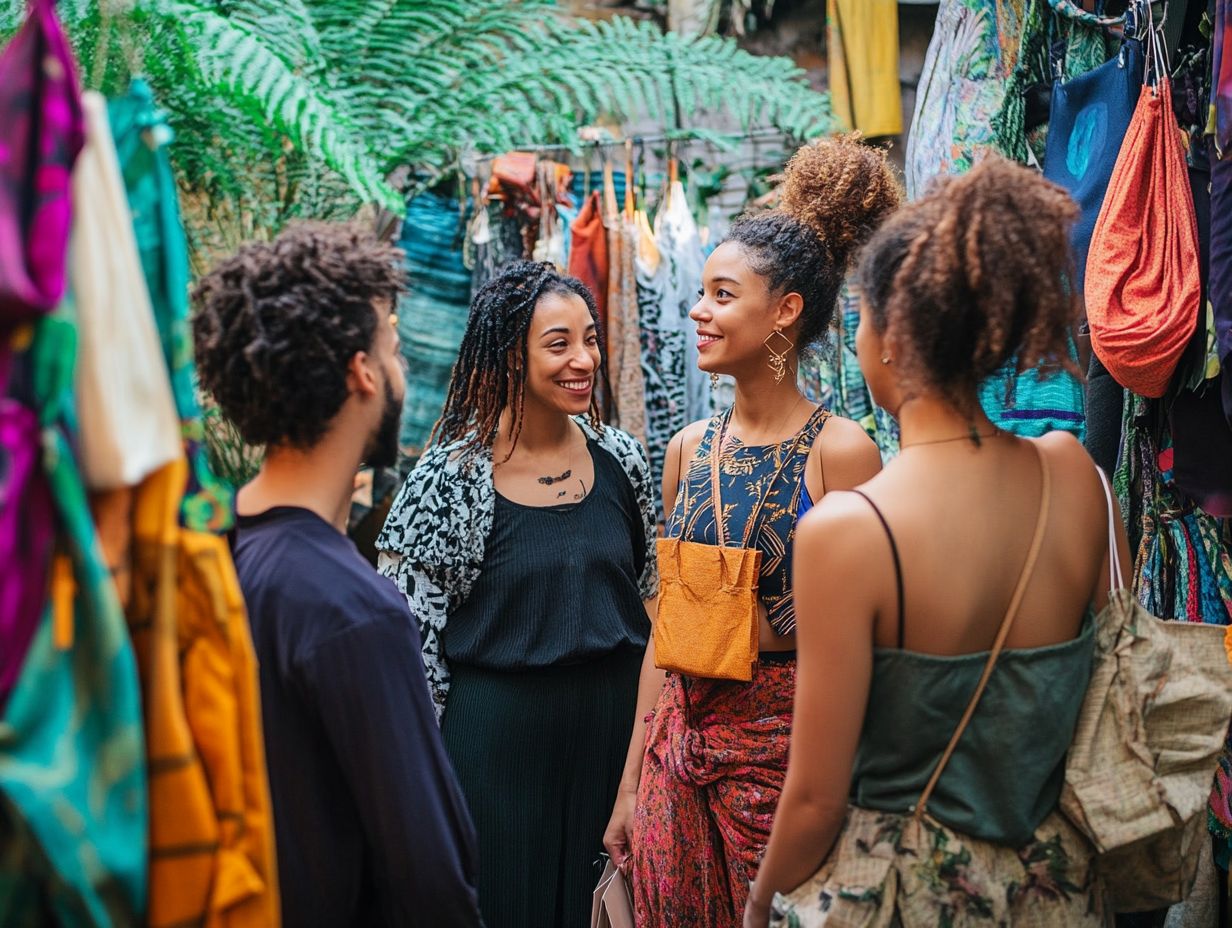
Building a capsule wardrobe is your gateway to sustainable fashion, focusing on curating a collection of essential pieces that prioritize quality over quantity. This approach fosters a versatile, timeless style that stands the test of trends.
By carefully selecting investment pieces, you can easily create a harmonious wardrobe! Consider fabrics, colors, and styles that not only work well across seasons but also resonate with your personal taste.
Mindful shopping is key in this journey; seek out brands that emphasize ethical production and sustainability to help mitigate the fashion industry’s environmental footprint. Consider integrating strategies such as clothing swaps or thrifting to find unique items for your capsule wardrobe. For guidance, check out this resource on how to transition to a sustainable wardrobe, ensuring that it remains not only functional and stylish but also environmentally responsible.
Upcycling and Secondhand Shopping
Upcycling and secondhand shopping are your exciting pathways to sustainable living, allowing you to reduce waste while scoring unique and affordable finds that align with your commitment to ethical fashion.
These practices play a crucial role in lowering the carbon footprint tied to traditional clothing production. They also encourage creativity and individuality in your personal style.
By giving pre-loved garments a fresh lease on life, you re participating in a circular economy that effectively minimizes textile waste.
Platforms like Vestiaire Collective and The RealReal are your go-to spots for high-quality secondhand treasures, making it effortless to discover designer pieces at a fraction of their original price. Embracing these options not only enriches your wardrobe but also supports a more environmentally conscious lifestyle, perfectly in tune with today s values of sustainability and cost-effectiveness.
Educating Others and Taking Action
Educating others and taking decisive action are vital in promoting ethical fashion. By raising awareness about sustainable practices, you inspire collective change and cultivate a demand for responsible clothing options.
Your efforts can spark a movement that not only transforms individual choices but also shapes the industry toward a more sustainable future.
Spreading Awareness and Supporting Change
Spreading awareness about ethical fashion and supporting change is essential. This helps create a culture that prioritizes sustainability and responsible consumer behavior.
Innovative campaigns that educate the public about the effects of fast fashion are highly effective. By using social media platforms, you can reach a wider audience and spark discussions around mindful shopping.
Engaging in community events like workshops and local fashion fairs allows you to connect with individuals on a personal level. This inspires them to embrace conscious choices. Your advocacy plays a pivotal role in driving industry-wide change, urging brands to reassess their practices and align with the growing consumer demand for transparency and sustainability.
Frequently Asked Questions
What does it mean to make ethical fashion choices?
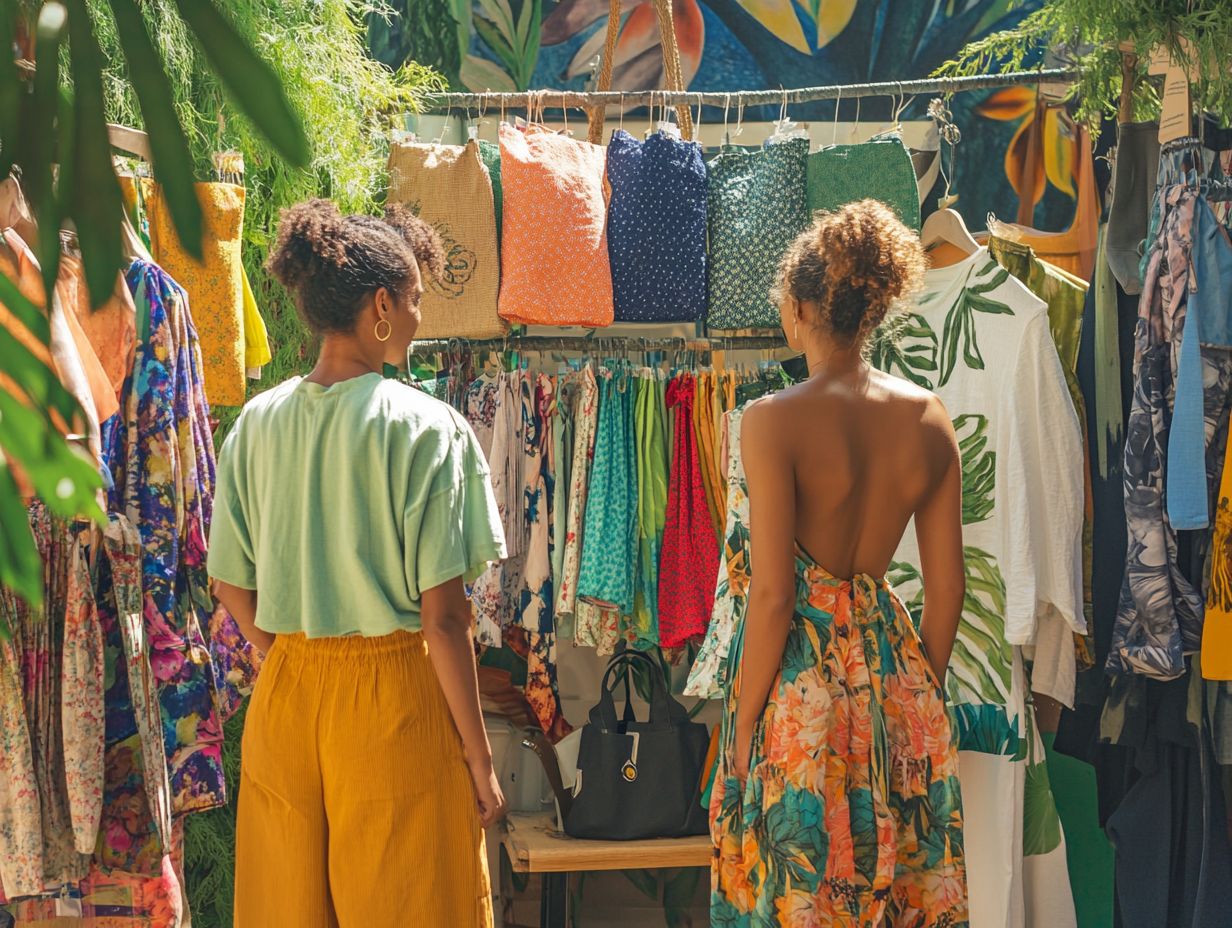
Making ethical fashion choices means considering the social, environmental, and economic impact of the clothing you purchase. This includes choosing items that have been produced in an ethical and sustainable manner.
What are some ways to make my fashion choices more ethical?
Buy from fair trade brands, choose quality over quantity, and shop second-hand or vintage clothing. Look for certifications such as GOTS or Fairtrade to ensure a brand meets ethical standards.
Why is it important to make ethical fashion choices?
Making ethical fashion choices is important because the fashion industry has a significant impact on the environment and workers’ rights. Supporting ethical and sustainable brands helps reduce the negative effects of fast fashion and promotes fair treatment of workers.
How can I find out if a brand is ethical?
You can research a brand’s values, policies, and practices on their website or through third-party certifications. Look for transparency in their supply chain and production processes.
What are the benefits of choosing ethical fashion?
By choosing ethical fashion, you contribute to a more sustainable and fair industry. You support brands that prioritize ethical values, positively impacting local communities. Ethical fashion often uses higher quality materials and production methods, resulting in longer-lasting and better-made clothing.
Can I still be fashionable while making ethical fashion choices?
Yes, you can! Many ethical and sustainable brands offer stylish and trendy clothing. Get creative by thrifting or upcycling items to create unique and fashionable outfits. Making ethical fashion choices does not mean sacrificing style.
Start making ethical fashion choices today and make a difference!
